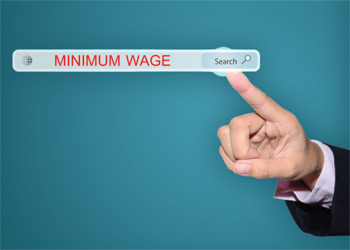
Solving Problems Begins with Asking the RIGHT Questions
Once again protesters took to the streets this month—and this time it wasn’t about police conduct. Protesters marched in cities all across the United States demanding an increase in the minimum wage. Debate over the minimum wage is timeless. While the current minimum wage is at about the same level in today’s dollars as it was when I earned $3.35 an hour back in the early 80s as a supermarket cashier, no one is arguing that 16-year-old kids need to be paid more. Instead, the debate centers on the relatively small number of adults trying to make ends meet on a minimum wage salary.
And you know what…I agree with the protesters. A 24-year-old single mother can’t make ends meet on the minimum wage. But asking what the right minimum wage is, to help that young mom, is the wrong question. And in asking the wrong question, we wind up looking to the wrong solutions.
Forcing a higher minimum wage on the whole fast food industry doesn’t solve the mom’s problem. At the same time, it creates new problems for restaurant owners and teenagers. For the restaurant owners, the problem is clear. For the teenager, a higher minimum wage will mean fewer jobs available. With teen unemployment already too high, this only exacerbates the problem.
So what is the right question to ask, you ask? The question is: Why is a 24-year-old single mother remaining in an unskilled position and not working to acquire skills that could offer her a career path? Why are we investing tax dollars in food stamps and the earned income tax credit while not investing more in skills development?
In fact if you think a couple of steps ahead, raising the minimum wage might be the worst thing we can do for our fictional mother. By making her a little more comfortable today—after all raising the minimum wage to $15 an hour would nearly double her pay in most states—she might continue to rely on her fast food job rather than developing skills and moving into a position with more potential.
Today there are is a shortage of truck drivers, nursing assistant, home health aides, electricians, utility workers, and many others.
The availability of unemployment insurance for extended periods of time is often cited as a contributing factor that discourages people from seeking the training they need to become more employable. Welfare and easy-to-justify disability payments are also credited with increased complacency. And of course, an education system that is not aligned with the needs of industry is also a problem.
The United States has spent billions (about $150 billion) rebuilding Iraq and Afghanistan. That amount of money would provide $15,000 worth of training to 10 million under-skilled American workers. Of course we’d have to grow the educational infrastructure to support it—but that is an investment with tremendous long-term rewards.
Raising the minimum wage doesn’t solve any problems. As a problem solving approach, it can be compared to the Affordable Care Act (ACA—aka ObamaCare). The ACA does nothing to actually improve the American healthcare system. All it does is shift around who pays for what. By investing in our education infrastructure and skills training to move people out of a lifetime trapped in minimum wage jobs and welfare we’d be making real change.
Today the increased technical nature of many jobs combined with regulation that demands more formal training and certification is leading to workers getting stuck in minimum wage jobs. The ability to make the leap to the next level requires real formal skills, not simply experience and maturity that come with a little experience. Raising the minimum wage will simply reduce the pressure to get out of unskilled minimum wage jobs in the first place. No one belongs in a minimum wage job for more than the first couple of years of their working life.
Another major problem with the debate over minimum wages is the role of unions. Unions are looking to increase their ranks by organizing fast food workers. That’s an absurd concept. Unskilled minimum wage jobs are not professions. They’re not careers. And people shouldn’t be trapped in them. In other unions, the idea is that you join a union and stay in it for life. Whether you’re an electrician or a teacher or an autoworker—these are skilled positions. They’re careers. The last thing we want is to encourage people to remain in unskilled fast food jobs longer than they otherwise might. What will unions do to move their members up and OUT? Unionizing unskilled labor would be like playing a sick joke on people, in many cases condemning them to a life of low wages forever.

